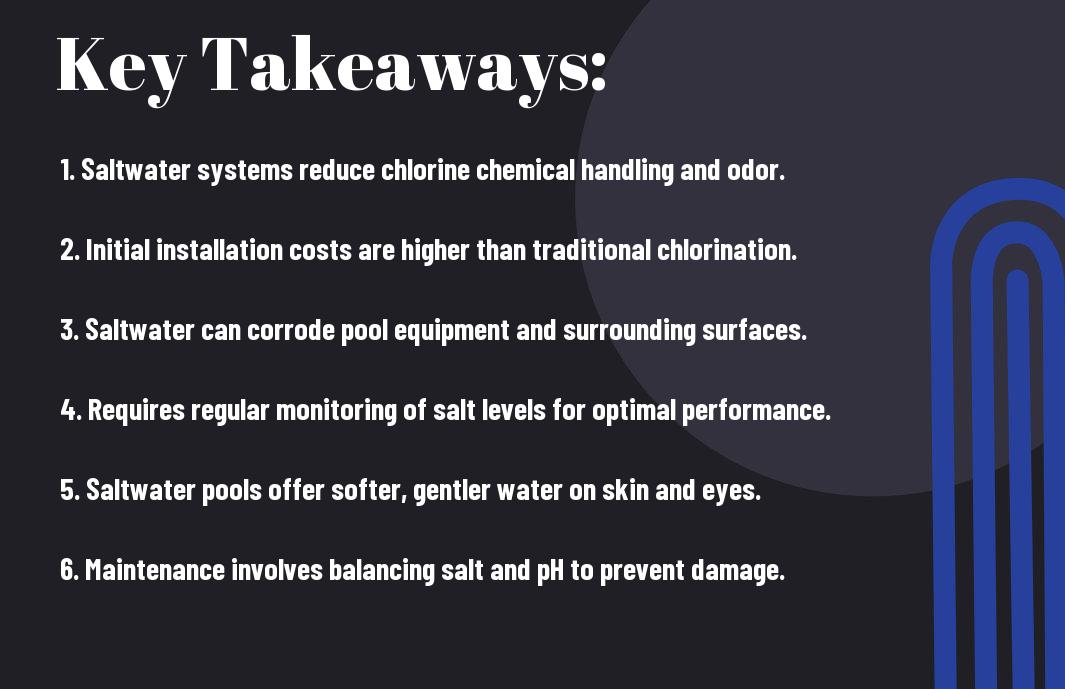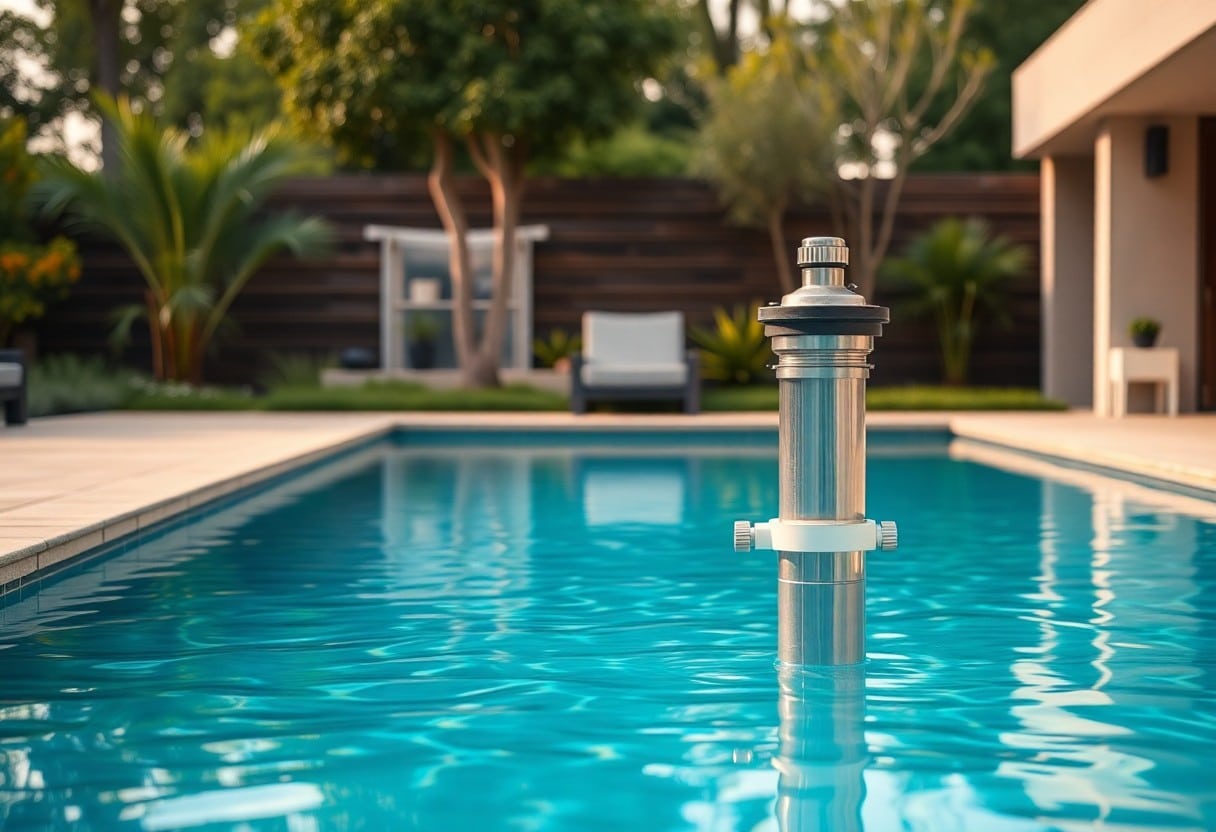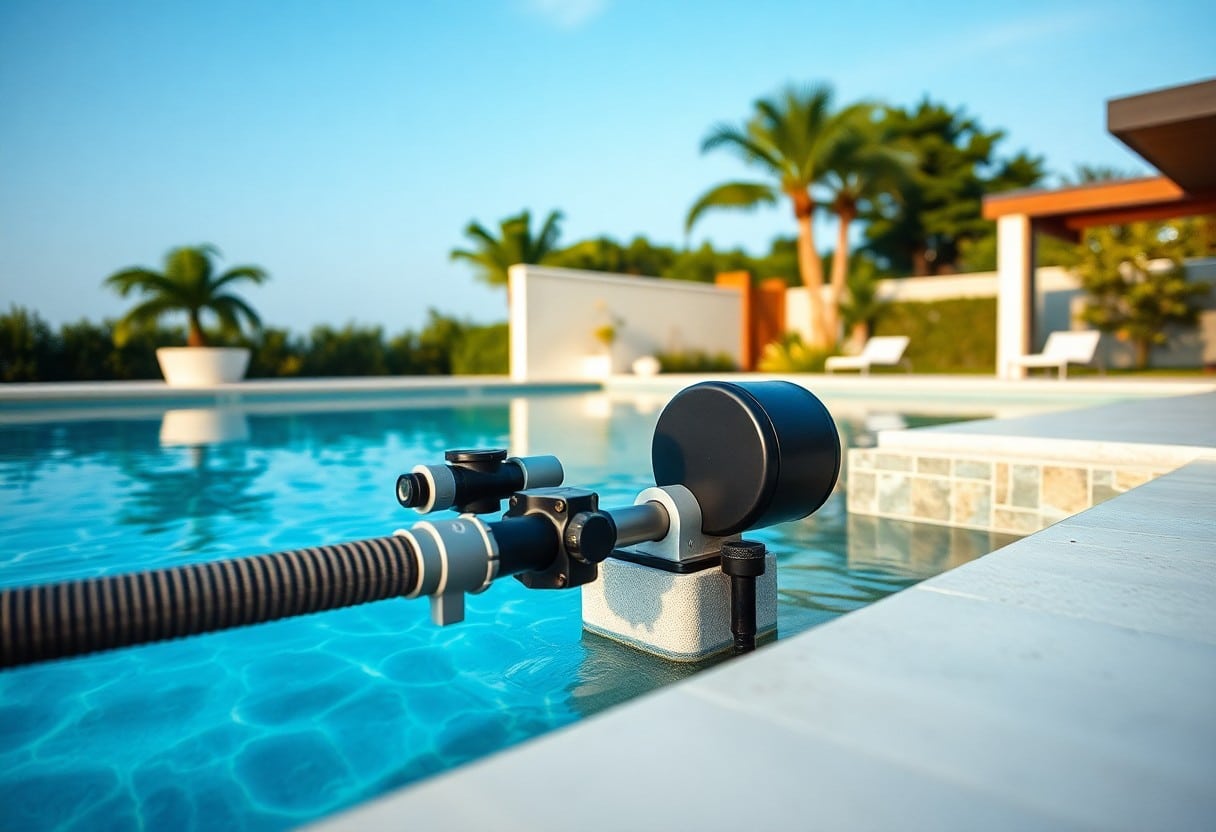You might be considering a saltwater system for your swimming pool, intrigued by its promise of lower chemical usage and softer water. However, it’s important to weigh the benefits against potential drawbacks, such as higher initial costs and maintenance requirements. In this post, we will explore the trade-offs involved in transitioning to a saltwater system, helping you make an informed decision for your backyard oasis.
Cost Analysis: Short-Term vs. Long-Term Investments
The decision between traditional chlorine systems and a saltwater system often hinges on a thorough cost analysis. Initial investment tends to favor chlorine pools, but the long-term savings associated with saltwater systems may sway your choice. Evaluating both the upfront costs and the ongoing operational expenses can help you determine which option aligns better with your budget and lifestyle.
Initial Setup Expenses
Setting up a saltwater system requires a higher initial expenditure compared to a conventional chlorinated pool. You can expect to spend between $1,500 to $3,000 on equipment, installation, and the salt itself. While the upfront investment can seem daunting, many homeowners view it as a valuable investment in their pool’s longevity and overall quality.
Maintenance Savings Over Time
Saltwater systems present potential long-term savings that can offset their initial costs. Once operational, these systems often lead to reduced expenses for sanitization and chemical balancing, as they generate their own chlorine. This means less frequent purchases of traditional pool chemicals, translating into consistent savings over time. Additionally, reduced wear and tear on equipment due to lower chemical levels can lead to decreased maintenance costs overall.
Over the span of several years, you may find that the savings accumulate significantly. For instance, many users report spending 50% less on annual chemical costs after switching to saltwater systems. With the added benefits of lower maintenance frequency and enhanced water quality, your investment might not just pay off but yield a more enjoyable swimming experience in the long run. You may also experience fewer skin and eye irritations, resulting in a more pleasant environment for family and friends. This combination of factors can make the decision increasingly favorable as your pool ages and your savings grow.

Health Benefits and Environmental Impact
Switching to a saltwater system not only enhances your swimming experience but also offers significant health benefits and contributes positively to the environment. You might find that your skin and eyes feel less irritated than with traditional chlorine systems, while the system’s overall reduction of harmful chemical use shapes a healthier pool atmosphere.
Reduced Chlorine Exposure for Swimmers
With a saltwater system, the generation of chlorine occurs in lower concentrations, leading to a more comfortable swimming experience. You can enjoy your time in the pool with diminished eye irritation and reduced skin dryness, making swimming a more pleasant activity for both you and your guests.
Sustainability and Reduced Chemical Use
Saltwater pools are more environmentally friendly, as they require fewer chemical additives than their chlorine counterparts. The natural process of converting salt into chlorine means you’ll not only use less harsh chemicals but also safeguard local ecosystems from chemical runoff. This more sustainable approach allows you to enjoy your pool without compromising on environmental standards.
Choosing a saltwater system can yield notable savings in the long run, as you’re more likely to reduce the frequent purchase of chemicals. The salt you use typically costs less than traditional chlorine, and the system’s efficiency leads to lower consumption rates. Overall, by reducing your dependence on harsh chemicals, you indirectly contribute to cleaner water sources, promoting a more sustainable lifestyle while still enjoying a pristine swimming experience. These attributes make saltwater systems an appealing option for environmentally-conscious pool owners.
Operational Challenges: What You Need to Know
Swimming pool saltwater systems offer many benefits, but you should also be aware of some operational challenges that may arise. Proper management and maintenance are important to ensure your system operates efficiently. Factors such as water chemistry balance, equipment performance, and regular upkeep can affect your saltwater pool experience. Understanding these challenges can help you navigate common issues and enjoy your pool fully.
Technical Complexity and Learning Curve
Managing a saltwater system introduces a layer of technical complexity compared to traditional chlorine pools. You’ll need to familiarize yourself with terms like salinity levels, TDS (total dissolved solids), and cell lifespan. This knowledge is crucial for optimizing your pool’s performance and preventing costly issues. If you’re new to pool maintenance, it might take time to become comfortable managing these variables effectively.
Equipment and Parts Availability
Access to parts and maintenance equipment can sometimes pose challenges for saltwater pool owners. While many of the necessary components are widely available online, local pool supply stores may not always stock specialized parts. In emergency situations, prolonged waiting for replacement cells or other important components can disrupt pool enjoyment. Being proactive about checking stock and having a reliable source for parts will save you time and stress down the line.
In terms of equipment and parts availability, consider establishing a relationship with a local pool store that specializes in saltwater systems. Not only will they provide access to required components, but they can also offer valuable advice and services tailored to your specific system. Additionally, keeping a small inventory of important parts, such as a spare salt cell or replacement o-rings, can prepare you for unforeseen issues, minimizing downtime and ensuring a smooth-sailing pool experience.

Water Quality Management: Comparing Systems
| System Type | Water Quality Characteristics |
|---|---|
| Saltwater Pools | Gentler on skin, stable chlorine levels, lower chemical usage |
| Traditional Chlorine Pools | Higher chlorine levels, potential for skin irritation, frequent chemical adjustments required |
Saltwater vs. Traditional Chlorine Pools
Saltwater systems produce chlorine through electrolysis, resulting in lower levels of chlorine smell and skin irritation compared to traditional chlorine pools. The consistent release of chlorine helps maintain stable water quality, minimizing the fluctuations typical in manually chlorinated systems.
Algae Control and Water Balance
Managing algae growth and overall water balance can differ significantly between saltwater and traditional chlorine systems. Saltwater pools often have a more stable pH level, leading to better water balance, but they still require attention to maintain appropriate alkalinity and calcium hardness to prevent algae blooms.
With saltwater systems, the continuous generation of chlorine aids in combating algae, but you still need to monitor other factors like pH and alkalinity. While saltwater pools typically maintain a more stable environment, algae can still thrive if you neglect these aspects. Regular testing and adjustments, along with appropriate filtration, will ensure that your saltwater pool remains inviting and free of algae, providing you with clearer and cleaner water throughout the swimming season.

User Experience: A Matter of Preference
Choosing between a saltwater system and traditional chlorine method is often rooted in personal preference, shaping your overall pool experience. Some users appreciate the softer feel of saltwater, while others may lean towards the familiar scent and maintenance routine of chlorine. Your previous swimming habits, sensitivity to chemicals, and aesthetic preferences significantly influence this decision, making it vital to assess what truly matters to you.
Swimmer Comfort and Feel
The comfortable experience of swimming in a saltwater pool stems from its mild salinity level, which is easier on your skin and eyes compared to the harshness of chlorinated water. Many swimmers even report feeling rejuvenated after a dip in saltwater, attributing a smoother experience to the regulated pH and the absence of strong chemicals, ultimately influencing your enjoyment of pool time.
Aesthetic Considerations of Pools
Aesthetically, saltwater pools tend to have a distinct allure, with a more inviting clarity and shimmering quality. The natural greenish-blue hue can create a tropical paradise appeal, enhancing your backyard’s visual appeal and making your space more inviting for gatherings and relaxation. Additionally, saltwater systems often require fewer chemical add-ons, keeping the appearance unblemished by harsh dyes or films.
When considering the aesthetic of saltwater pools, think about how the visual presentation can complement your landscape. The water’s translucence showcases your pool’s tile patterns and underwater features more vividly, giving a luxurious and polished look that chlorine pools may lack. Moreover, the reduced need for harsh chemicals allows for cleaner surfaces and fewer maintenance concerns, translating into an inviting swimming environment that feels just as good as it looks.
Final Words
Considering all points, utilizing a swimming pool saltwater system offers both advantages and drawbacks that you should weigh carefully. On one hand, you can enjoy lower long-term costs and a gentler swimming experience, while on the other hand, initial setup and maintenance can be more demanding than traditional systems. It’s vital to assess your specific needs and preferences to determine if a saltwater system aligns with your lifestyle. Ultimately, the right choice will enhance your pool experience and ensure maintenance is manageable for you.
